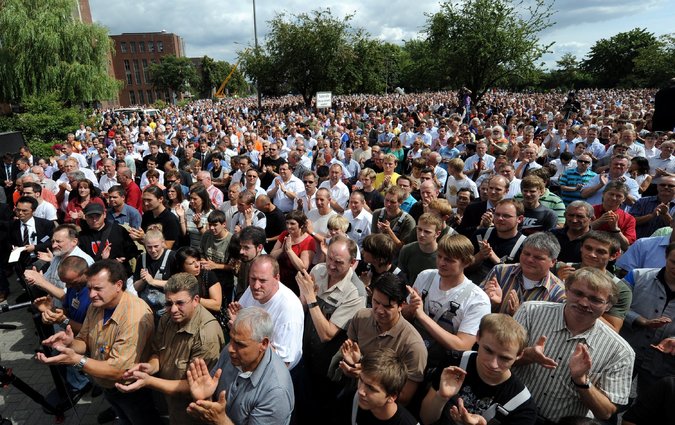
WOLFSBURG, Germany — All cars at the headquarters should, according to the rules, be parked facing the same way. The firm is controlled by a tight-knit troika of a billionaire family (Ferdinand Porsche’s descendants), a German state government (Lower Saxony) and powerful labor unions. The corporate jet is not just any jet, but a full-size Airbus.
Volkswagen, by any standards, has an unusual corporate culture.
As the automotive giant struggles to explain a globe-spanning emissions-cheating scandal, its management culture — confident, cutthroat and insular — is coming under scrutiny as potentially enabling the lawbreaking behavior, according to current and former employees, analysts and academics who study the 78-year-old institution. “They only know one way of management,” said a high-ranking executive who has worked in several countries for the carmaker and who requested anonymity for fear of losing his job: “Be aggressive at all times.”
On Thursday, Volkswagen’s chief executive, Matthias Müller, publicly acknowledged the problem and promised to make changes, including selling the Airbus. “A company of our size, international reach and complexity cannot be managed with structures from the past,” he said.
During a historic public statement, Mr. Müller and Hans Dieter Pötsch, chairman of Volkswagen’s supervisory board, gave the first in-depth public accounting of VW’s admission, made about three months ago, that it had installed special software in millions of cars in the United States and Europe designed to deceive emissions-testing procedures. Mr. Pötsch said that the evasion had begun earlier than previously thought, in 2005, and that nine executives so far, one more than disclosed earlier, had been suspended.
VW has blamed a small group of engineers for the misconduct, and has said that members of its management board did not know of the decade-long deception.
Some critics say the scale of the problem suggests the involvement of separate engineering teams. VW said this month that 50 potential whistle-blowers had come forward, hinting at wider knowledge of the cheating. Its own investigation has disclosed that the illegal diesel software was installed in VW, Audi and Porsche models using several engine designs that went through numerous updates over 10 years.
The idea that a few engineers are responsible “just doesn’t pass the laugh test,” said John German, a former official at the Environmental Protection Agency and a senior fellow at the International Council on Clean Transportation, an environmental group that played a role in uncovering Volkswagen’s cheating.
The company, briefly the world’s biggest carmaker before the emissions scandal struck, claims a unique history that has defined its leadership for generations. Founded by the Nazis with the help of Ferdinand Porsche, the inventor of the Beetle, today the company is 50 percent owned by his descendants. The state of Lower Saxony and Qatar’s sovereign wealth fund own most of the rest. Independent shareholders control just 12 percent.
Volkswagen’s factory was built with money confiscated from trade unions, which after World War II were granted a say in management as compensation.
Today, by law, labor holds half the 20 seats on VW’s board, as with every major German company. But at Volkswagen, two more seats are occupied by Lower Saxony, which in practice cannot vote against labor. So the union effectively controls the board.
The two men who have led Volkswagen and shaped its culture much of the past 20 years are Ferdinand Piëch, the chief executive from 1993 until 2002, and Martin Winterkorn, the chief executive from 2007 until his resignation after the scandal became public.
Mr. Piëch, a grandson of Mr. Porsche, is an engineer who made his name shaping Audi to take on BMW and Mercedes-Benz. His tenure came to be defined by his toughness and willingness to demote or dismiss people who were not performing well. “My need for harmony is limited,” he wrote in his 2002 autobiography, titled “Auto.Biographie.”
Mr. Piëch, who fathered 12 children, including two with his cousin’s ex-wife, has acknowledged he was not a typical manager. “Only when a company is in severe difficulty do they let in someone like me,” he wrote. “In normal, calm times I never would have gotten a chance.”